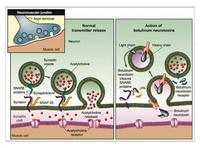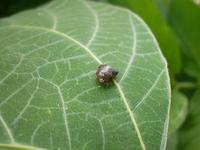-
A majority on Earth will soon face severe, self-inflicted water shortage: scientists

A conference of 500 leading water scientists from around the world, held last week in Bonn, issued a stark warning that, without major reforms, “in the short span of one or two generations, the majority of the nine billion people on Earth will be living under the handicap of severe pressure on fresh water, an absolutely essential natural resource for which there is no substitute. This handicap will be self-inflicted and is, we believe, entirely avoidable.”
-
-
Studying botulinum genome to understand botulism harm

The toxin that causes botulism is the most potent that we know of. Eating an amount of toxin just 1,000th the weight of a grain of salt can be fatal, which is why so much effort has been put into keeping Clostridium botulinum, which produces the toxin, out of our food.
-
-
Illnesses in U.S. on the rise as a result of decline in foreign food inspections
More Americans get sick every year as a result of food-borne pathogens. The reason: inspections at foreign food factories shipping food and food ingredients to the United States have declined in recent years, and border inspections of food coming into the country could be next to be reduced. Experts say this decline in inspections is especially worrisome since Americans consume more imported food – or food made with imported ingredients – every year, and foreign food production and processing facilities often do not meet U.S. sanitation and hygiene standards.
-
-
Horse meat in the human diet
Horse long has been on menus in continental Europe, sold from shops that often advertise with a carved horse head on the store front.A chemist explains the testing for horse DNA in food products, and discusses the concerns about selling and eating horse meat in the United States.
-
-
New fertilizer can be used to grow food – but not build bombs

Ammonium nitrate fertilizer is used in agriculture, but when mixed with a fuel such as diesel, it is highly explosive. It was used in about 65 percent of the 16,300 homemade IEDs in Afghanistan in 2012.About 1,900 troops were killed or wounded in IED attacks in 2012, 60 percent of American combat casualties. There have been more than 17,000 global IED incidents in 123 countries in the past two years. Timothy McVeigh used ammonium nitrate in Oklahoma City in 1995. Scientists have developed a fertilizer that helps plants grow but cannot detonate a bomb.
-
-
Volatility of food prices is still a mystery
Riots, political instability, and a spike in malnourishment cases blighted the years 2007 and 2008, particularly in developing countries. The cause was a sudden surge in global food prices, with rice eventually rising several hundred per cent as importing countries simply could not get enough of this basic foodstuff.Food market volatility has yet to be understood, and there is no definite proof that it is due to speculators.
-
-
New detection test to improve food safety, bioterrorism defense
Sales of chicken products in China plummeted recently during an outbreak of a deadly new strain of bird flu. From bird flu to mad cow disease, numerous food scares have made global headlines in recent years.Scientists develop new detection technique which wouldmake food contamination testing more rapid and accurate. The detection test could also accelerate warnings after bioterrorism attacks.
-
-
Interior Dept. releases progress report on U.S. Water Census
The U.S. Interior Department issued released a report to Congress on the progress of the National Water Census. As competition for water grows — for irrigation of crops, for use by cities and communities, for energy production, and for the environment — the need for the National Water Census and related information and tools to aid water resource managers also grows. The Water Census will assist water and resource managers in understanding and quantifying water supply and demand, and will support more sustainable management of water resources.
-
-
Deadly wheat disease threats global food supplies
Disease-resistant wheat developed over the past half century helped ensure steady world food supplies, but a global research team warns that without increased financial support for disease resistance research, new strains of a deadly fungal disease could leave millions without affordable access to food.
-
-
Invasive kudzu bugs pose greater threat than previously thought

The invasive kudzu bug has the potential to be a major agricultural pest, causing significant damage to economically important soybean crops. Conventional wisdom has held that the insect pests will be limited to areas in the southern United States, but new research shows that they may be able to expand into other parts of the country.
-
-
Population growth a challenge to secure supplies of energy, food, water
Mention great challenges in feeding a soaring world population, and thoughts turn to providing a bare subsistence diet for poverty-stricken people in developing countries. An expert says, however, that there is a parallel and often-overlooked challenge: the global population will rise from seven billion today to almost nine billion people by 2040. Providing enough food to prevent starvation and famine certainly will be a daunting problem.
-
-
Arsenic contamination in food and water supplies
After virtually eliminating arsenic as a useful tool for homicide, science now faces challenges in doing the same for natural sources of this fabled old “inheritance powder” that contaminates water supplies and food, threatening more than thirty-five million people worldwide.
-
-
Farm states pass bills to protect farms from activists, whistle-blowers
In an effort to stop animal rights activists from recording acts of animal cruelty on farms, lawmakers in twelve states have proposed or enacted bills which would make it illegal secretly to record livestock farms or apply for a job at a farm without disclosing ties to animal right organizations.
-
-
China catches 12 times more fish beyond its waters than it reports
Chinese fishing boats catch about $11.5 billion worth of fish from beyond their country’s own waters each year — and most of it goes unreported. Researchers estimate Chinese foreign fishing at 4.6 million tons per year, taken from the waters of at least ninety countries — including 3.1 million tons from African waters, mainly West Africa.
-
-
Nanobiotechnology kills listeria, other food-borne pathogens, dead
Researchers, using nature as their inspiration, successfully attached cell lytic enzymes to food-safe silica nanoparticles, and created a coating with the demonstrated ability selectively to kill listeria — a dangerous foodborne bacteria that causes an estimated 500 deaths every year in the United States. The coating kills listeria on contact, even at high concentrations, within a few minutes without affecting other bacteria.
-
- All
- Regional
- Water
- Biometrics
- Borders/Immig
- Business
- Cybersecurity
- Detection
- Disasters
- Government
- Infrastructure
- International
- Public health
- Public Safety
- Communication interoperabillity
- Emergency services
- Emergency medical services
- Fire
- First response
- IEDs
- Law Enforcement
- Law Enforcement Technology
- Military technology
- Nonlethal weapons
- Nuclear weapons
- Personal protection equipment
- Police
- Notification /alert systems
- Situational awareness
- Weapons systems
- Sci-Tech
- Sector Reports
- Surveillance
- Transportation
Advertising & Marketing: advertise@newswirepubs.com
Editorial: editor@newswirepubs.com
General: info@newswirepubs.com
2010-2011 © News Wire Publications, LLC News Wire Publications, LLC
220 Old Country Road | Suite 200 | Mineola | New York | 11501
Permissions and Policies
Editorial: editor@newswirepubs.com
General: info@newswirepubs.com
2010-2011 © News Wire Publications, LLC News Wire Publications, LLC
220 Old Country Road | Suite 200 | Mineola | New York | 11501
Permissions and Policies
